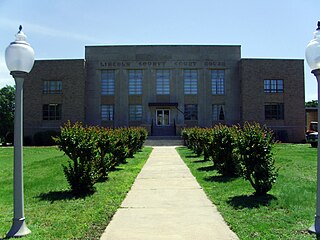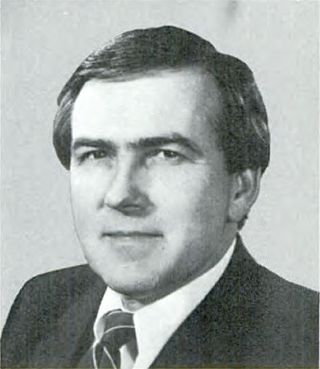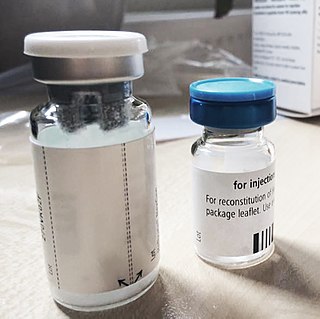Related Research Articles

Lincoln County is located between the Arkansas Timberlands and Arkansas Delta in the U.S. state of Arkansas. It is also within the Pine Bluff metro area, and on the outer edge of the Central Arkansas region. The county is named for President Abraham Lincoln. Created as Arkansas's 65th county on March 28, 1871, Lincoln County has three incorporated cities, including Star City, the county seat and most populous city. The county contains 46 unincorporated communities and ghost towns, Cane Creek State Park at the confluence of Cane Creek and Bayou Bartholomew, and nine listings on the National Register of Historic Places to preserve the history and culture of the county.

Pine Bluff is the 10th most populous city in the US state of Arkansas and the county seat of Jefferson County. It is the principal city of the Pine Bluff Metropolitan Statistical Area and part of the Little Rock-North Little Rock-Pine Bluff Combined Statistical Area. The population of the city was 41,253 in the 2020 census.
A private prison, or for-profit prison, is a place where people are imprisoned by a third party that is contracted by a government agency. Private prison companies typically enter into contractual agreements with governments that commit prisoners and then pay a per diem or monthly rate, either for each prisoner in the facility, or for each place available, whether occupied or not. Such contracts may be for the operation only of a facility, or for design, construction and operation.

The Arkansas Department of Corrections (DOC), formerly the Arkansas Department of Correction, is the state law enforcement agency that oversees inmates and operates state prisons within the U.S. state of Arkansas. DOC consists of two divisions, the Arkansas Division of Corrections (ADC) and the Arkansas Division of Community Corrections (DCC), as well as the Arkansas Correctional School District. ADC is responsible for housing and rehabilitating people convicted of crimes by the courts of Arkansas. ADC maintains 20 prison facilities for inmates in 12 counties. DCC is responsible for adult parole and probation and offender reentry.
The Canadian Red Cross Society is a Canadian humanitarian charitable organization, and one of 192 national Red Cross and Red Crescent societies. The organization receives funding from both private donations and from Canadian government departments.
The Department of Corrections is the public service department of New Zealand charged with managing the New Zealand corrections system. This includes the operations of the 18 prisons in New Zealand and services run by Probation. Corrections' role and functions were defined and clarified with the passing of the Corrections Act 2004. In early 2006, Corrections officially adopted the Māori name Ara Poutama Aotearoa.

Tommy Franklin Robinson is an American businessman, lobbyist, and politician who served as the U.S. representative for Arkansas's 2nd congressional district from 1985 to 1991. He is a member of the Republican Party. Before he was elected to Congress, Robinson was the sheriff of Pulaski County.

The tainted blood disaster, or the tainted blood scandal, was a Canadian public health crisis in the 1980s in which thousands of people were exposed to HIV and hepatitis C through contaminated blood products. It became apparent that inadequately-screened blood, often coming from high-risk populations, was entering the system through blood transfusions. It is now considered to be the largest single (preventable) public health disaster in the history of Canada.

The Cummins Unit is an Arkansas Department of Corrections prison in unincorporated Lincoln County, Arkansas, United States, in the Arkansas Delta region. It is located along U.S. Route 65, near Grady, Gould, and Varner, 28 miles (45 km) south of Pine Bluff, and 60 miles (97 km) southeast of Little Rock.

The Varner Unit is a high-security state prison for men of the Arkansas Department of Correction in Varner, Choctaw Township, unincorporated Lincoln County, Arkansas, United States. It is located along U.S. Highway 65, near Grady, and 28 miles (45 km) south of Pine Bluff. The prison can house over 1,600 prisoners, and it includes a 468-bed supermax facility. The supermax and non-supermax facilities are separate from one another.

Factor 8: The Arkansas Prison Blood Scandal is a feature-length documentary by Arkansas filmmaker and investigative journalist, Kelly Duda, released in 2005. Through interviews and the presentation of documents and footage, Duda alleged that in the 1970s and 1980s, the Arkansas prison system profited from selling blood plasma from inmates infected with viral hepatitis and HIV. The documentary contends that thousands of victims who received transfusions of blood products derived from these plasma products, Factor VIII, died as a result.

Kelly Duda is an American filmmaker and activist from Arkansas best known for the 2005 documentary, Factor 8: The Arkansas Prison Blood Scandal.
Thomas O. Murton was a penologist best known for his wardenship of the prison farms of Arkansas. In 1969, he published an account of the endemic corruption there which created a national scandal, and which was popularized in a fictional version by the film Brubaker.
Contaminated hemophilia blood products were a serious public health problem in the late 1970s up to 1985.

The GEO Group, Inc. (GEO) is a publicly traded C corporation that invests in private prisons and mental health facilities in the United States, Australia, South Africa, and the United Kingdom. Headquartered in Boca Raton, Florida, the company's facilities include illegal immigration detention centers, minimum security detention centers, and mental-health and residential-treatment facilities. It also operates government-owned facilities pursuant to management contracts. As of December 31, 2021, the company managed and/or owned 86,000 beds at 106 facilities. In 2019, agencies of the federal government of the United States generated 53% of the company's revenues. Up until 2021 the company was designated as a real estate investment trust, at which time the board of directors elected to reclassify as a C corporation under the stated goal of reducing the company's debt.

The contaminated blood scandal, also known as the infected blood scandal, is a British medical scandal in which a large number of people were infected with hepatitis C and HIV, as a result of receiving contaminated blood or contaminated clotting factor products. Many of the products were imported from the US, and distributed to patients by the National Health Service throughout the 1970s and 1980s. Most recipients had haemophilia or had received a blood transfusion following childbirth or surgery. It has been estimated that more than 30,000 patients received contaminated blood, resulting in the deaths of at least 3,000 people. In July 2017, Prime Minister Theresa May announced an independent public inquiry into the scandal, for which she was widely praised as successive governments going back to the 1980s had refused such an inquiry. May stated that "the victims and their families who have suffered so much pain and hardship deserve answers as to how this could possibly have happened." The final report was published in seven volumes on 20 May 2024, concluding that the scandal could have been largely avoided, patients were knowingly exposed to "unacceptable risks", and that doctors, the government and NHS tried to cover-up what happened by "hiding the truth".

The Tucker Unit is a prison in Dudley Lake Township, unincorporated Jefferson County, Arkansas, 25 miles (40 km) northeast of Pine Bluff. It is operated by the Arkansas Department of Correction (ADC). Tucker is one of the state of Arkansas's "parent units" for male prisoners; it serves as one of several units of initial assignment for processed male prisoners. It is in proximity to, but not within, the Tucker census-designated place.
The Randall L. Williams Correctional Facility is a prison of the Arkansas Department of Correction (ADC) located in the "Pine Bluff Complex" in Pine Bluff, Arkansas. The 576-bed facility sits on a 10-acre (4.0 ha) plot of land.

Barbara A. Ester Unit is a correctional facility of the Arkansas Department of Correction (ADC), located in Pine Bluff, Arkansas. It is scheduled to have a capacity of 580 prisoners, and it is the first prison in the ADC dedicated to the re-entry of prisoners into society. In addition to prisoners who are to be released within six months, it also houses prisoners who were incarcerated due to disobeying the rules of their parole. The prison's namesake is Barbara Ester, a prison guard holding the rank corporal at the East Arkansas Unit. She died on January 20, 2012, at the hands of a prisoner.
Bosasa was a South African company specialising in providing services to government, most notably correctional services. It consisted of Bosasa Group, Bosasa Youth Development Centres, and African Global Operations. The company was liquidated in 2019 after whistleblower Angelo Agrizzi revealed the malfeasance in prolonged scandal about its allegedly corrupt relationship with members of the governing African National Congress (ANC), aired during the Zondo Commission of Inquiry.
References
- 1 2 3 4 5 Ridgeway, James (2004). It's all for sale : the control of global resources. Durham : Duke University Press. ISBN 978-0-8223-3426-2.
- 1 2 3 4 5 Encyclopedia of Arkansas (2024). "Arkansas Prison Blood Scandal". Encyclopedia of Arkansas. Retrieved 2024-06-07.
- ↑ Chase, Sophia (2012-04-01). "The Bloody Truth: Examining America's Blood Industry and its Tort Liability Through the Arkansas Prison Plasma Scandal". William & Mary Business Law Review. 3 (2): 597. ISSN 2159-7146.
- ↑ "Final report. Commission of Inquiry on the Blood System in Canada". collection.nlc-bnc.ca. Archived from the original on April 11, 2013. Retrieved 2015-01-10.